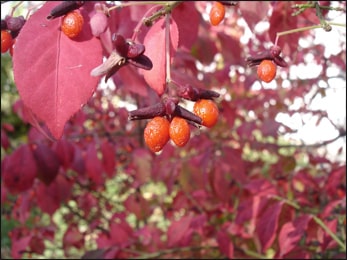
Overview
Wahoo bark is botanically known as Euonymus Astropurpureus. It belongs to the family of Celastraceae. Wahoo is also known with other common names like American wahoo, burning bush, eastern wahoo and a heart bursting with love. Its berries are attractive and red in color. Wahoo is spreading, upright, adaptable shrub or small tree. Its twigs are slender and dark purple in color, sometimes four angled or slightly winged.
General Description
Wahoo or Euonymus astropurpureus is a deciduous herb which grows up to 8 m tall and stems reaching up to 10 cm of diameter. Wahoo bark is gray, lightly fissured and smooth. Leaves of this herb are elliptical, 8-11 cm long and 3-5 cm broad. These leaves are long pointed at the tip and with a finely serrated margin. Wahoo’s flowers are bisexual, 10-12 mm in diameter with four brown-purple petals, for green sepals and four stamens. The fruit is smooth, red to pink in color and has four lobules. This Wahoo plant reproduces by reseeding itself. This plant attracts birds and wildlife.
Where is Wahoo Distributed?
It is mainly found in the meadows, open slopes, stream banks and in moist soils.
What are the Common names of Wahoo?
Bitter ash, Peg wood, Bursting heart, Spindle tree, Pig wood, Fish wood, Strawberry tree, Whahow, Indian arrow wood, Indian root, and burning ash.
What is the Chemical Composition of Wahoo?
Wahoo consists of Euonymin, asparagin, peculiar euonic acid and inorganic salts.
What is its Medicinal Action?
This herb has been used by physicians for long times. Its bark has various medicinal properties
- Tonic action
- Laxative
- Expectorant
- Diuretic
- Anti – Malarial
What are the Medicinal uses of the Wahoo Bark?
- It is used to treat intermittent fever after the chill has been broken.
- Wahoo relieves dyspepsia and burning sensation in the stomach.
- Pulmonary affections can be effectively treated by the use of this herb.
- It stimulates the flow of the bile.
- Wahoo is very effective to treat malarial fever, known to have anti-malarial action.
- This herb stimulates the nutritive process and also increases appetite.
- Indigestion can be treated by the use of the Wahoo bark.
- It is an effective remedy for obstinate constipation. It has laxative effects and hence treats constipation.
- Wahoo improves gastric debility.
- This herb helps to treat dropsy due to renal and hepatic inactivity.
- It treats effectively prostration with irritation of the nerve centers.
- Wahoo supplements the action of quinine.
- Anorexia is treated by the use of constipation.
- It relieves nausea and vomiting.
- This herb stimulates the heart and digestive system. It has stimulant action like digitalis.
- Wahoo bark has a diuretic action, increases the frequency of urination.
- It is known to be an effective gallbladder remedy, treats various ailments of the gallbladder.
- Given in small doses it stimulates appetite while if given in large doses irritate intestines.
- Expectorant action of the Wahoo bark helps to treat various respiratory ailments
- Wahoo bark treats eczema which has arises due to poor gallbladder and liver activity.
- It treats dandruff if the powdered form of bark is applied to the scalp.
What are the Side-Effects of Wahoo Bark?
- It is unsafe to take it during pregnancy or breastfeeding. If taken during these phases, it can endanger you as well as your baby.
- Wahoo bark consists of caffeine. So if it is taken in large amount can worsen diarrhea.
- As it can worsen diarrhea and it is one of the main symptoms of Irritable bowel syndrome. So it can cause to aggravate IBS.
- Taking it in large doses can worsen intestinal and stomach disorders.
- Its fruit, bark, and seeds are considered to be poisonous. If taken can cause seizures, syncope, weakness, diarrhea, vomiting, and chills.
